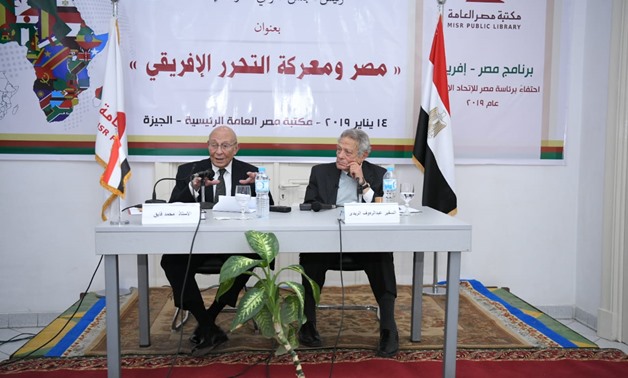
Head of the National Council for Human Rights Mohamed Fayek (L) and Misr Public Library Director Abdel Raouf el-Reidy - Press photo
CAIRO – 15 January 2019: Egypt’s contributions in the African continent has been discussed, with experts recalling roles that date back to Pharaonic era, during a seminar titled: “Egypt and the African Liberalization movements.”
The seminar was held at the Misr Public Library in Giza on Monday, and the chairman of the library, Abdel Raouf el-Reidy made the opening speech as he announced the kick-start of a “rich talk” about Africa. The seminar coincides with the birthday anniversary of late Egyptian President Gamal Abdel Nasser, who has been hailed for his role towards Africa, and for strengthening ties with the continent.
The discussions were led by the head of the National Council for Human Rights Mohamed Fayek shared historical facts and powerful stories from the past, highlighting the importance of Egypt and the Nile River for the continent and quoting the Greek historian Herodotus’ saying “Egypt is the Gift of the Nile,” Fayek added, “And I say the Nile River is the Gift of Africa.”
“There are current African stances that showed significant empowering of Egypt’s leadership in the continent,” said Fayek, referring to the chairmanship of the African Union and the hosting of the 2019 Africa Cup of Nations.
Fayek went on to speak about the problems that faced Africa before the 23 July Revolution in 1952 in Egypt, and Cairo’s role in the African Liberalization movements like Kenya’s Mau Mau uprising in 1952. According to him, Egypt has provided military training and ammunition to African states that gained independence, besides supporting non-aligned policy, resisting Israel aggressions and opening up markets such as textiles, palm seeds and others.

Side of Africa and Egypt seminar at Misr Public Library - press photo
Besides economic and social cooperation, Fayek assured to Egypt Today that “for youth to understand and feel the African continent, they should be exposed to different African arts and culture.”
Member of Parliament Hamdy Bekheit criticized terms like “Sub-Saharan Africa,” which refers to all African countries that are fully or partially located south of the Sahara, as an attempt to divide North of Africa from the south. Many African experts argued the term should be rejected, as it refers to the entire African continent, except for the five predominantly Arab states of the North, including Egypt.
“Egypt’s link to the continent proves its role is very important due to its leadership in several geographical circles including: Mid-east, Mediterranean and the Red Sea regions,” he said.
Bekheit, who is a member of Parliamentarian committee for African affairs, added another circle which is the Islamic circle, given several Muslim-majority African countries.
“The chairmanship of the African Union will enable Egypt to suggest ideas that enhance unity, solidarity and the political movement of the continent,” he said, ensuring a win-win situation for both the continent and Egypt.

Side of Africa and Egypt seminar at Misr Public Library - press photo
The seminar has shed light on the “treasures” that needed to be explored in Africa, and that Egypt should be aware of the continents’ needs and seeks to enhance its role, saying that other countries like China, Iran, U.S. and Israel have managed over the past years to successfully approach the continent’s needs.
Regarding security challenges and civil wars facing many African states, Bekheit said that Egypt can play an effective mediation role based on its history as a strong mediator and its new position as the head of the African Union.



Comments
Leave a Comment